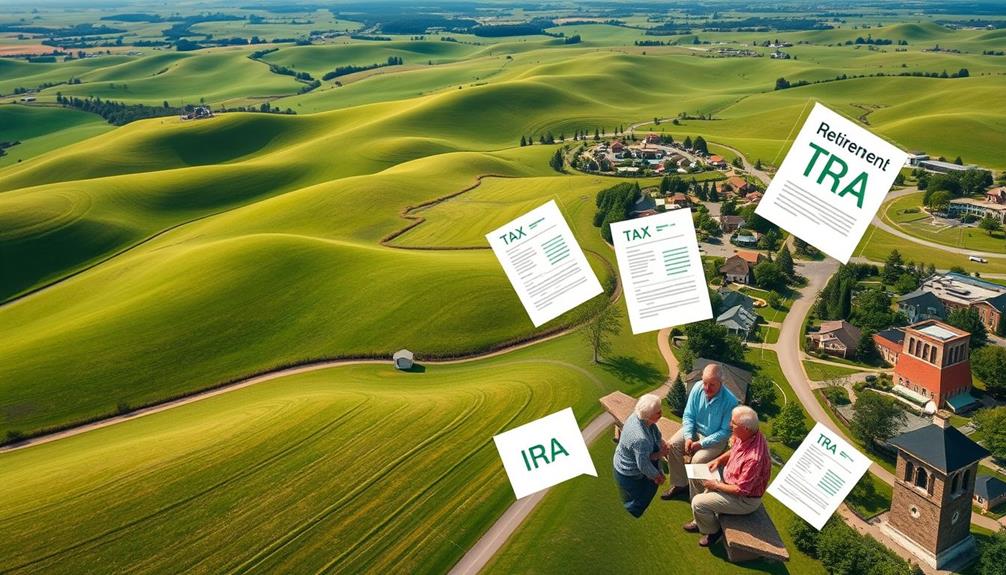When you take money out of your IRA in Oklahoma, that money is considered taxable income. However, if you are 65 or older, you are eligible to claim a $10,000 deduction on your retirement income, which can help lower the amount subject to taxes. Withdrawals that exceed this deduction will be taxed at rates ranging from 0.5% to 5%. To claim this deduction, you must file Schedule 511-A. It is wise to seek advice from a financial advisor to create a customized withdrawal plan and reduce your tax liability. There is plenty more to learn about retirement tax planning in Oklahoma!
Key Takeaways
- Oklahoma fully exempts Social Security benefits from state income tax, benefiting retirees' disposable income.
- Individuals aged 65 and older can deduct $10,000 from eligible retirement income, including IRA withdrawals.
- IRA withdrawals are taxable income; amounts exceeding the $10,000 deduction are taxed at rates between 0.5% and 5%.
- To claim the retirement income deduction, individuals must file Schedule 511-A to report eligible retirement income.
- Consulting financial advisors can help develop tax-efficient withdrawal strategies and stay updated on state tax law changes.
Oklahoma Retirement Tax Overview

Oklahoma offers a retirement-friendly tax landscape that can benefit retirees considerably. One of the most appealing aspects is that Social Security retirement benefits are fully exempt from Oklahoma income tax, allowing you to keep more of your hard-earned money.
If you're 65 or older, you can also claim a $10,000 retirement income deduction on taxable income from sources like IRAs, 401(k)s, and pensions. This deduction means that if your retirement income exceeds $10,000, only the amount above that limit gets taxed at Oklahoma's state income tax rates, which range from 0.5% to 5%. That's a significant advantage for managing your retirement income tax burden.
Additionally, property taxes in Oklahoma are relatively low, averaging around $1,349 per year with an effective rate of 0.89%, making it easier for retirees on fixed incomes.
While the statewide sales tax is 4.5%, local rates can push that to about 7%, with groceries also subject to sales tax. However, low-income tax credits can help mitigate these costs.
Taxation on IRA Withdrawals

When planning your retirement income, understanding how IRA withdrawals are taxed in Oklahoma is essential. Withdrawals from your IRA are considered taxable income, so you'll need to include them when calculating your total taxable income for state income tax purposes.
In Oklahoma, seniors aged 65 and older can claim a $10,000 retirement income deduction, which encompasses IRA withdrawals. This deduction can notably reduce your taxable income, but any withdrawals exceeding this amount will be subject to state income tax rates ranging from 0.5% to 5%. To claim the retirement income deduction for your IRA withdrawals, you'll need to file Schedule 511-A with your state tax return.
Here's a quick overview:
| Age | Deduction Amount |
|---|---|
| Under 65 | $0 |
| 65 and older | $10,000 |
| Tax Rates | 0.5% to 5% |
| Filing Required | Schedule 511-A |
It's wise to consult with financial advisors to help you develop strategies for minimizing tax liabilities related to your IRA withdrawals in Oklahoma.
Social Security Benefits in Oklahoma

Retirees in Oklahoma can take advantage of a considerable benefit: Social Security retirement benefits are fully exempt from state income tax. This exemption means you won't have to worry about state income taxes eating into your hard-earned retirement income.
Regardless of your adjusted gross income, this tax relief applies to everyone receiving Social Security, making Oklahoma an attractive option compared to other states.
With 39 states following suit and not taxing Social Security benefits, Oklahoma aligns with these tax-friendly states, allowing you to maximize your financial resources. The lack of state tax on Social Security can greatly enhance your disposable income, making financial planning easier and more effective.
Additionally, if you're aged 65 or older, you can enjoy further exemptions for retirement income, which can improve your overall tax situation. This means you can focus more on enjoying your retirement rather than stressing over how much you'll owe in state income taxes.
With these advantages, Oklahoma stands out as a great place to retire, especially for those relying heavily on Social Security retirement benefits.
Retirement Income Deductions

When it comes to retirement income deductions, knowing which types of income qualify is key.
In Oklahoma, you can claim a deduction on your IRA and 401(k) withdrawals, but there's a specific process to follow.
Let's break down the eligible income sources and how to apply for the deduction to help you maximize your tax benefits.
Eligible Retirement Income Types
Understanding eligible retirement income types is essential for maximizing deductions and minimizing tax liabilities. In Oklahoma, seniors aged 65 and older can claim a $10,000 retirement income deduction on various sources of eligible retirement income, including distributions from IRAs, 401(k)s, and pensions. This deduction helps reduce your taxable income, providing significant savings.
One major advantage in Oklahoma is that Social Security retirement benefits are fully exempt from state income tax, further enhancing your financial situation. If your eligible retirement income exceeds the $10,000 limit, you'll need to file Schedule 511-A to claim the deduction on the excess amount.
Keep in mind that any retirement income above this threshold is subject to Oklahoma's state income tax rates, which range from 0.5% to 5%.
Additionally, the low property tax rate of 0.89% in Oklahoma contributes to a tax-friendly environment, making it an attractive state for retirees.
State Deduction Application Process
Maneuvering the state deduction application process for retirement income can feel overwhelming, but it doesn't have to be.
By following these simple steps, you can take full advantage of the retirement income deduction in Oklahoma:
1. Determine Eligibility: If you're 65 or older, you can claim a $10,000 deduction on taxable retirement income, which includes IRA and 401(k) withdrawals.
2. Gather Documentation: Collect all necessary financial documents that show your total retirement income.
Accurate reporting is vital since only taxable income qualifies for the deduction.
3. Complete Schedule 511-A: When filing your state income tax return, fill out Schedule 511-A to claim the retirement income deduction.
This form is essential for ensuring you receive your deduction.
4. Consult Financial Advisors: If you're uncertain about the process, reach out to financial advisors.
They can guide you through the state deduction application process and help maximize your tax benefits.
State Income Tax Rates

State income tax rates can markedly impact your financial planning, especially for retirees withdrawing from IRAs and 401(k) plans. In Oklahoma, these rates range from 0.5% to 5%, applying to taxable income exceeding the $10,000 deduction available for retirement income for seniors aged 65 and older.
As a retiree, it's essential to recognize that income from your IRA withdrawals and 401(k) plans is considered taxable income, which means you'll be subject to these state income tax rates.
Fortunately, you can mitigate your overall state tax liability by claiming the $10,000 deduction on your retirement income. To guarantee you're taking full advantage of this deduction, don't forget to file Schedule 511-A when preparing your tax return. This form allows you to account for all eligible income, including IRA withdrawals.
Because of the available deductions, the effective state tax rate for retirees may end up being lower than initially expected. This creates a more favorable tax environment for you as you navigate your retirement income, making it easier to manage your finances while enjoying your hard-earned savings.
Property and Sales Taxes

When it comes to managing your expenses in retirement, property and sales taxes in Oklahoma can play a significant role. Understanding these taxes can help you navigate your financial landscape more effectively. Here are some key points to evaluate:
- Property Taxes: Oklahoma has an average effective property tax rate of 0.89%, which is relatively low compared to national averages. The median property tax payment is about $1,349, making it manageable for most retirees.
- Homestead Exemptions: Seniors may qualify for homestead exemptions, further reducing their property tax liabilities. These exemptions are also available for disabled veterans and surviving spouses.
- Sales Taxes: The statewide sales tax rate is 4.5%, but with local rates, it can reach around 7%. Although sales taxes apply to groceries, low-income tax credits can help offset some costs.
- Overall Cost of Living: Despite higher sales taxes, Oklahoma's overall cost of living remains low, making it an attractive option for retirees looking to stretch their dollars further.
Planning for Retirement Taxes

Planning for retirement taxes can greatly impact your financial stability in Oklahoma. To maximize your retirement income, it's crucial to understand how state tax laws affect your IRA withdrawals and other sources of income.
In Oklahoma, if you're 65 or older, you can deduct up to $10,000 from your taxable retirement income, which includes withdrawals from your IRAs, 401(k)s, and pensions. This deduction can considerably lower your taxable income, reducing the amount you owe in state tax.
Additionally, Social Security benefits are fully exempt from state income tax, providing further financial relief. However, any retirement income exceeding the $10,000 deduction will be subject to Oklahoma's state income tax rates, ranging from 0.5% to 5%.
To take advantage of this retirement income deduction, you must file Schedule 511-A with your state income tax return.
It's wise to reflect on tax strategies that optimize the timing and amount of your IRA withdrawals. By planning ahead, you can minimize your taxable income and enhance your overall financial health during retirement in Oklahoma.
Consulting Financial Advisors

When it comes to handling IRA withdrawals, getting professional guidance is essential.
A financial advisor can tailor tax strategies to fit your unique situation and help you navigate Oklahoma's state regulations.
Regular consultations keep you informed about any changes that could impact your retirement planning.
Importance of Professional Guidance
Steering through the complexities of state tax implications for IRA withdrawals can be challenging, especially in Oklahoma where specific deductions apply. Engaging with financial advisors is essential to guarantee you're making informed decisions about your retirement income.
Here are a few reasons why consulting with these professionals is important:
- Understanding Deductions: Financial advisors can clarify the $10,000 deduction available for retirement income for those aged 65 and older, helping you maximize your benefits.
- Tax Efficiency: They can provide tailored strategies to minimize state income tax liabilities on IRA withdrawals that exceed the deduction, allowing you to keep more of your hard-earned money.
- Navigating Tax Forms: Advisors can assist you in completing necessary paperwork, like Schedule 511-A, to claim those retirement income deductions effectively.
- Monitoring State Tax Rates: They help evaluate the impact of Oklahoma's state tax rates, which range from 0.5% to 5%, on your overall financial plan, especially when combining IRA withdrawals with other income sources.
Tailoring Tax Strategies
Steering through the specifics of IRA withdrawals requires a strategic approach, especially in Oklahoma. Consulting with financial advisors can greatly enhance your understanding of the state income tax implications tied to these withdrawals.
After applying the $10,000 deduction for retirement income, the remaining distributions are subject to Oklahoma's income tax rates, which range from 0.5% to 5%.
Financial advisors can help you develop tailored withdrawal strategies that optimize your tax liabilities while guaranteeing compliance with state tax laws. They can guide you on the necessity of filing Schedule 511-A to claim deductions and avoid potential pitfalls.
Furthermore, advisors can provide personalized strategies that address the tax treatment of investment income, including interest and dividends, which also fall under state income tax.
Engaging with these financial experts guarantees you stay informed about any changes in state tax laws that could affect your retirement planning.
By leveraging their expertise, you can make informed decisions about your IRA withdrawals, ultimately maximizing your retirement income and minimizing tax liabilities.
Don't navigate these complex waters alone—seek out the guidance of a financial advisor to help you achieve your financial goals.
Navigating State Regulations
Maneuvering state regulations surrounding IRA withdrawals can feel overwhelming, but you don't have to tackle it alone. Consulting with financial advisors can make a significant difference in understanding how to optimize your taxable income in Oklahoma.
Here are four key benefits of working with a financial advisor:
- Expert Guidance: Financial advisors have in-depth knowledge of Oklahoma's tax laws, ensuring you're aware of potential deductions related to your IRA withdrawals.
- Tailored Strategies: They can craft personalized strategies that minimize your state income tax exposure, helping you retain more of your retirement funds.
- Filing Assistance: Advisors can assist you in completing Schedule 511-A, which is essential for claiming deductions on retirement income, including IRA withdrawals.
- Resource Matching: Many financial advisors leverage online matching tools to connect you with professionals who specialize in managing state tax regulations concerning IRA distributions.
Frequently Asked Questions
Do You Pay State Income Tax on IRA Withdrawals?
Yes, you pay state income tax on IRA withdrawals. The amount is subject to your state's tax rates. However, deductions might apply, especially for retirees, potentially reducing your overall taxable income from those withdrawals.
What Is the Retirement Tax Exclusion in Oklahoma?
You might think all retirement income is taxed, but in Oklahoma, you can deduct up to $10,000 of your retirement income, including IRA withdrawals, from your taxable income if you're 65 or older.
What Is the Retirement Exclusion for Oklahoma in 2024?
In 2024, you can claim a $10,000 deduction on retirement income in Oklahoma. This includes IRA and 401(k) distributions, helping you reduce your taxable income and keep more of your hard-earned retirement savings.
Do You Pay State Taxes on 401K Withdrawals?
You bet, you pay state taxes on 401(k) withdrawals. Just like a vintage car that needs upkeep, your withdrawals might require some tax attention, especially if they exceed the retirement income deduction.
Conclusion
Steering through state tax implications for IRA withdrawals in Oklahoma can feel like walking through a maze, but it doesn't have to be overwhelming. By understanding how your withdrawals are taxed, along with other retirement income considerations, you can make informed decisions that benefit your financial future. Remember, planning ahead is key to maximizing your retirement savings. Don't hesitate to consult a financial advisor to help guide you through the complexities and keep you on the right path.









